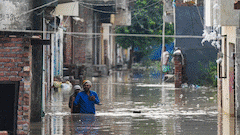Project Cheetah's 1st Anniversary: 14 Big Cats Healthy, None Died Due To Radio Collars, Says KNP Official
KNP official Yadav said that 14 cheetahs are completely healthy and are doing well and no cheetah died due to radio collars.

As Project Cheetah completes one year, Head of Project Cheetah SP Yadav has said that out of 20 cheetah brought to Kuno National Park in Madhya Pradesh from Namibia and South Africa, 14 (adults) are completely healthy and are doing well. Amid some suggestions that possible infections linked to radio collars could be the cause of the deaths of cheetahs, Yadav said that not a single cheetah died due to radio collars.
On July 16, the environment ministry said five out of the 20 adult cheetahs brought from Namibia and South Africa died due to natural causes, and media reports attributing the deaths to factors like radio collars were based on "speculation and hearsay without scientific evidence".
S P Yadav said that radio collars can't be a cause of death and the claims that the cheetah deaths were caused by radio collars are completely false. "In the whole world carnivores and other animals are monitored by radio collars. It is a proven technology. Radio collars can't be a cause of death. The claims that the cheetah deaths here were caused by radio collars are completely false," Yadav said.
#WATCH | Member Secretary NTCA and Head of Project Cheetah S P Yadav says, "In the whole world carnivores and other animals are monitored by radio collars. It is a proven technology. Radio collars can't be a cause of death. The claims that the cheetah deaths here were caused by… pic.twitter.com/68uBuihTfz
— ANI (@ANI) September 15, 2023
In an exclusive interview to ANI, Yadav said that carnivores and animals are monitored all over the world by radio collars, and this is a proven technology. "There is no truth that any cheetah died due to radio collars. I want to say that monitoring is not possible in the wild without radio collars," he said.
"A total of 20 cheetahs were brought from Namibia and South Africa, out of which 14 (adults) are completely healthy and are doing well. Four cheetahs were born on the soil of Bharat, and one of them is now six months old and doing fine. The three cubs died because of climatic factors," Yadav told ANI.
No Cheetah Died Due To Hunting And Poaching, Says Yadav
Nine cheetahs have died in Kuno National Park since March of this year. Yadav said no cheetah died at Kuno National Park due to "hunting or poaching".
"Generally, in other countries, poaching and hunting lead to deaths, but our preparation was so good that not even a single cheetah has died due to hunting, poaching, or poisoning, nor has any cheetah died due to human conflict. We have successfully achieved milestones in the past year," he said, as quoted by ANI.
"There has never been an attempt to move a cheetah from one continent to another, and this was the first wild-to-wild translocation, and there were a lot of challenges in it. Usually, in such long-distance translocations, a cheetah may die because it is a sensitive animal, but no such death occurred here, and the translocation was very seamless," he added.
Yadav said cheetahs were reintroduced in the country last year after 75 years. "If we look at the last year from the point of view of success, then the benchmark we had set has been achieved," he said, adding that the survival rate of cheetahs is more than 50 per cent. "Cheetah cubs have been born on Bharat soil. The process of adaptation to climate is going as per expectations, and they are creating their own territory, fighting for their own territory, doing natural hunting—all this is happening...," the senior official said.
Yadav said, as per the MoU, South Africa is ready to provide 12 to 14 cheetahs every year. "Preparations are going on for the next batch of cheetahs at two sites; one is Gandhi Sagar Wildlife Sanctuary in Madhya Pradesh, where the habitat is suitable, and the work of making enclosures is going on at a very fast pace. I hope that in November-December the work of fencing and enclosure will be complete and a decision will be taken to bring cheetahs there after inspection," he said, as quoted by ANI.
What Is Project Cheetah?
Cheetahs, brought from Namibia, were introduced in India under Project Cheetah, which is the world's first inter-continental large wild carnivore translocation project. PM Modi released wild cheetahs, which had become extinct in India, in Kuno National Park on September 17 last year.
Twenty cheetahs were relocated from Namibia and South Africa to Kuno National Park in two batches—in September last year and in February this year. Twelve cheetahs from South Africa arrived on February 18 in Kuno National Park after South Africa signed a Memorandum of Understanding (MoU) on cooperation in the re-introduction of cheetahs in India. Eight cheetahs were brought from Namibia and were released by PM Modi.
Radio collars have been installed in all the cheetahs, and there is monitoring through satellite too. Apart from this, a dedicated monitoring team keeps monitoring the location. Following the translocation of 12 cheetahs in February from South Africa, the plan is to translocate 12 annually for the next eight to 10 years.






































